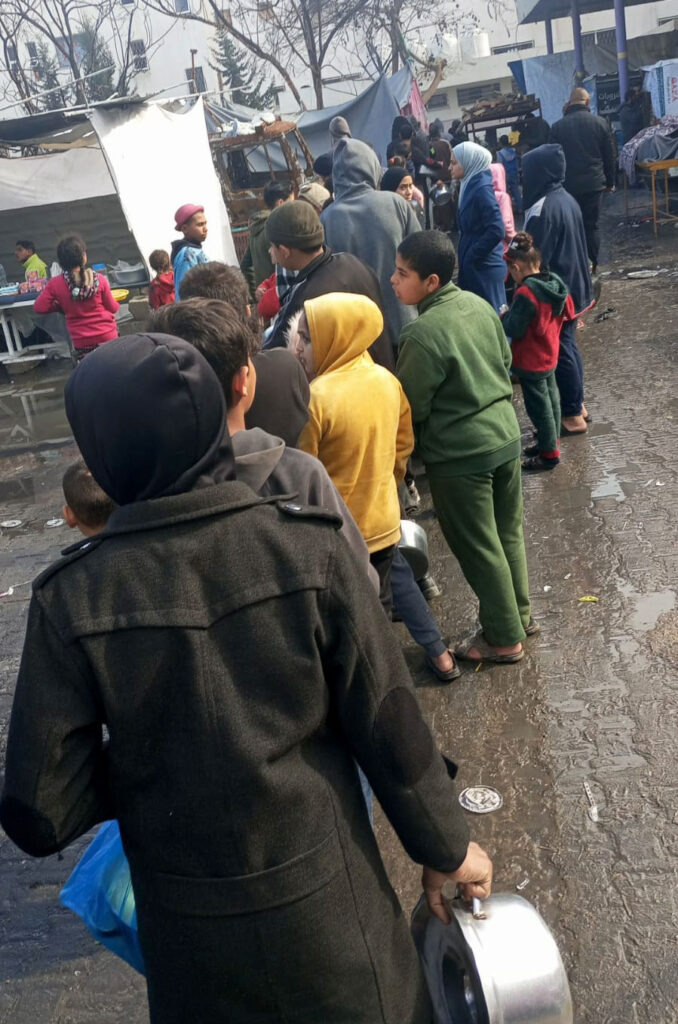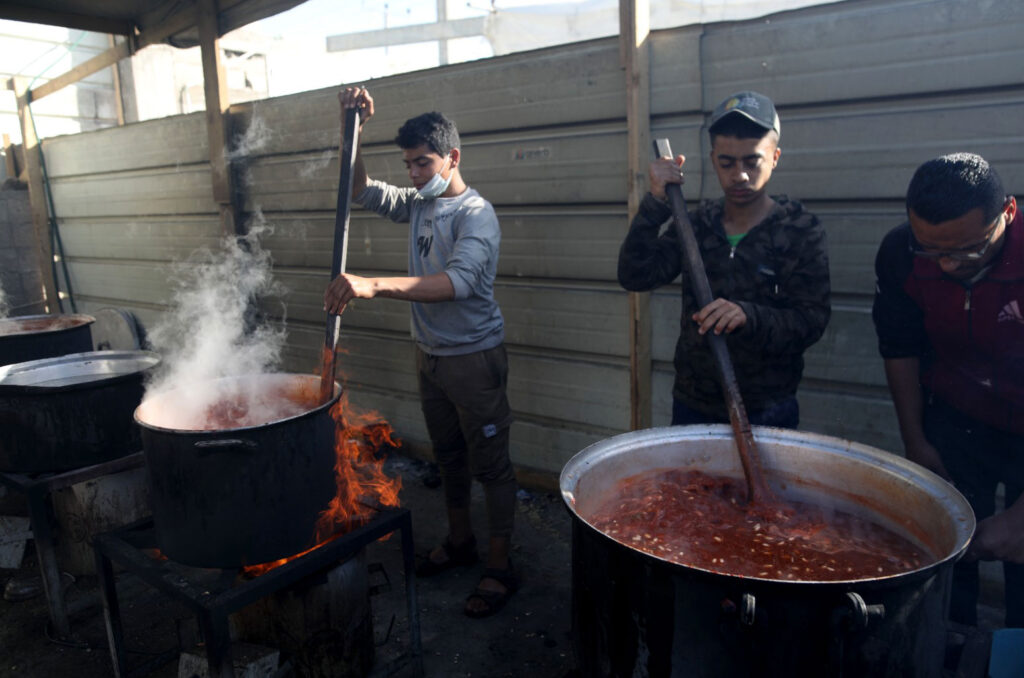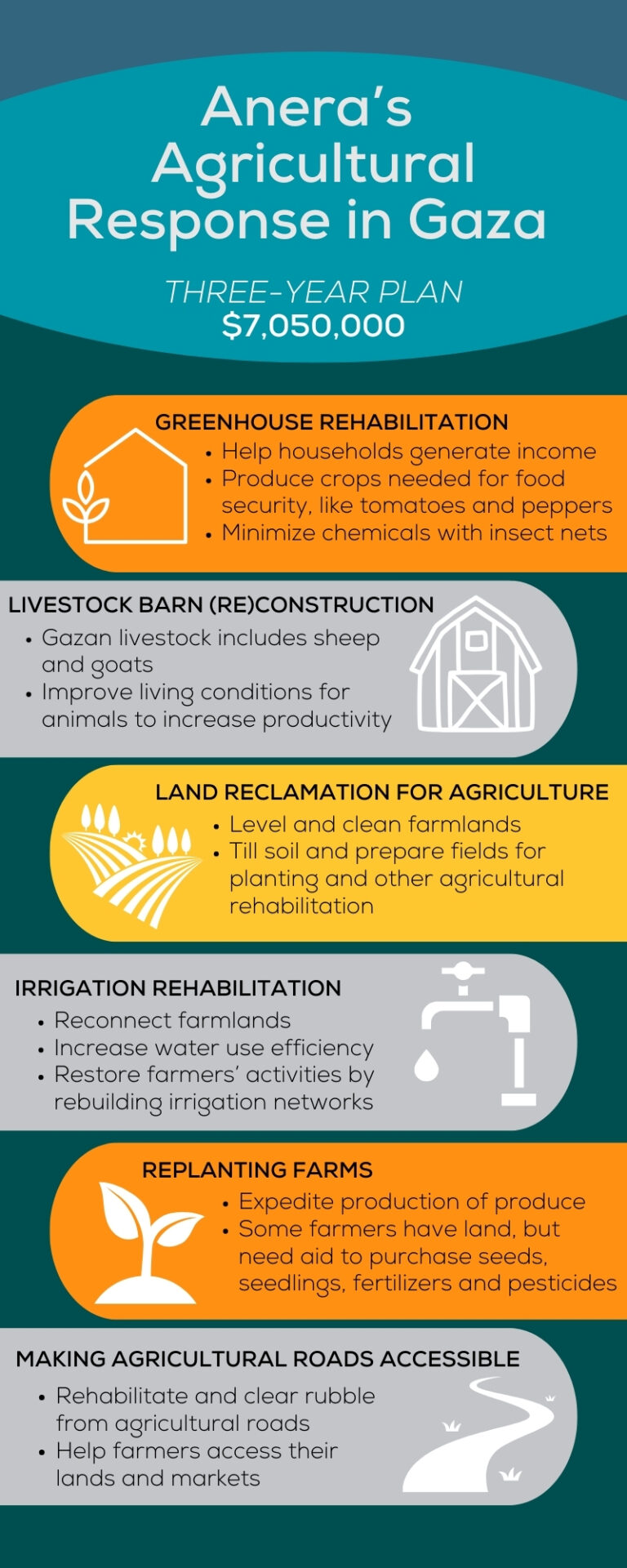Food Production Systems Under Attack in Gaza
Part of a series on the impact of the war on all sectors of economic life within Gaza, Anera’s immediate response and plans for the future. Other posts cover livelihoods, housing, WASH, health and education systems.
Long-term damage to Gaza’s food production infrastructure points to the wide ranging scope of the crisis
Since the war on Gaza began in October, reports from Gaza indicate that Israel is targeting and destroying food systems, exacerbating an already dire food crisis. This destruction in Gaza inhibits immediate access to food, but also reduces the population’s long-term routes for food autonomy and sustainability.
In Gaza, the population of 2.3 million Palestinians is being starved by the tightened blockade that Israel has imposed for the last four months. Since October 8th, a tight siege has allowed only very limited quantities of water, food, fuel, and essential supplies to enter Gaza. Gaza is now on the verge of famine. The swift imposition of widespread food deprivation on millions has been so severe that the people of Gaza now compose over 80% of all people starving globally. All children under the age of five are at a high risk for severe malnutrition, leading to stunting, which can irreversible impact on growth and development.
Israeli ground forces have systematically decimated food production systems and prevented Gazans from harvesting and making their own food. United Nations reports and FAO data (provided to Anera, pre-publication), indicate that Israel has blocked access to farmland and the sea, razed 28% of Gaza’s cropland, destroyed over 70% of Gaza’s fishing fleet, and damaged 488 agricultural wells and 21% of Gaza’s greenhouses. Livestock are starving and unable to provide a source of food, while Israel’s restrictions on fuel reduce Gaza residents’ ability to cook for themselves.
Any food that does remain in Gaza is inaccessible due the fighting and infrastructure damage. Stores, if they remain standing, are totally depleted and prices are exorbitantly high for any goods that remain. While food aid could help, very little is getting in, especially to the northern half of Gaza. Some people are able to receive one meal a day through aid. They are the minority, however, and reports indicate that many are now grinding animal feed to make flour.


Functioning food systems are essential to community wellbeing. Agricultural production, such as working in a field or greenhouse, promotes food independence and self-sufficiency. On a communal level, food systems generate important resources like food, jobs, and culture. These resources create the stability necessary for community identity and support. As long as Gaza does not have its own, robust food system, the people there will be extremely vulnerable. Before the war, 80% of Gaza’s population already depended on humanitarian aid. Now, with Israel’s destruction of their food system, the situation has gotten much worse. UN human rights experts have described how this damage creates other forms of harm:
“Not only is Israel killing and causing irreparable harm against Palestinian civilians with its indiscriminate bombardments, it is also knowingly and intentionally imposing a high rate of disease, prolonged malnutrition, dehydration, and starvation by destroying civilian infrastructure.”
A ceasefire and a vastly scaled-up system of food aid and distribution are the immediate steps needed to address the food crisis happening in Gaza. But the full scale of the destruction, people’s needs, and long-term effects of the war can only be assessed after the fighting stops. Whatever the political and military outcomes of the current conflict, we can be confident that Palestinians in Gaza will be committed to rebuilding the agriculture sector and reviving local and sustainable food systems.
Anera’s Rapid Response to Hunger in Gaza
Since the start of the war, Anera has delivered almost 15 million meal servings in the form of food parcels, vegetable baskets, fresh bread and hot dishes. Before aid trucks were allowed in, all food items came through our local network of vendors within Gaza. From October 21 onwards, in coordination with the UN food cluster, community-based organizations, and Anera’s teams in Jordan and Egypt, Anera has daily organized truckloads of supplies for entry into Gaza, many of which include food items and water. The team continues to purchase fresh vegetables and meat locally, even as costs have risen by up to ten times the original price.
Anera’s Gaza staff oversees local suppliers operating five active tekias – community kitchens – in Rafah, the middle area and Khan Younis. At our tekias, scores of chefs and their helpers prepare tasty, filling food and equitably distribute servings to displaced people who come to the kitchen.
Anera’s work in Gaza would not be possible without our tekias, or community kitchens, that provide food to displaced families. The concept began and flourished during the Ottoman era and into the present, as a place where travelers could rest, grab a meal, and continue their journey.
Learn more about tekias.
Our Gaza team will expand the number and reach of our tekias throughout Gaza. When a ceasefire happens, hundreds of thousands of Gazans will still be displaced due to massive destruction of residential buildings. Food insecurity will persist as well, because food supply infrastructure has also been badly damaged or destroyed. Anera’s tekias will keep supplying food as long as the need remains.


Anera’s Longer-term Response in Gaza’s Agricultural Sector
After the war ends, over the course of three years, Anera will work to revitalize Gaza’s agriculture sector with a comprehensive plan totaling $7,050,000. The initiative encompasses several key activities to address the aftermath of the war and pre-existing challenges – clearing agricultural roads and farmlands of debris, fixing damaged irrigation networks and reconnecting them to farms, rehabilitating greenhouses and (re)constructing barns for livestock, and restoring crops through replanting. It is our hope that we can help small farmers recover their livelihoods quickly so they can support their communities with healthy, locally produced food.


OUR BLOG
Related
In this log, Anera provides updates on unfolding war in Palestine and our response. Please stay tuned here for the latest information. To subscribe for weekly updates via SMS on our response in Gaza, text GAZA to 1-866-549-0055. Questions? See…
In this log, Anera provides regular updates on unfolding hostilities in Lebanon and our response efforts. Our community makes our emergency response possible. Please consider donating today. Our team is working around the clock to expand this assistance, but we…
A Syrian Refugee’s Struggle in Lebanon For 43-year-old Abu Jaafar, survival has become a daily fight. A Syrian refugee displaced by the conflict, he is now living on the streets of Beirut with his five children. Having lost everything to…
